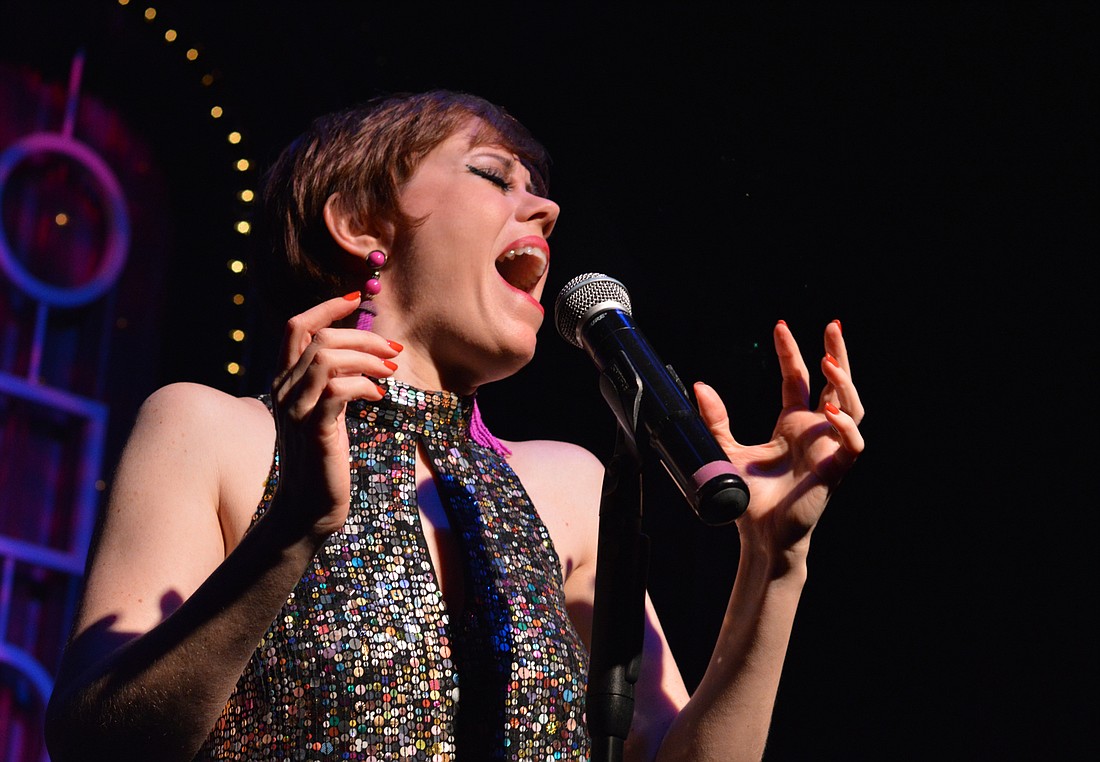- December 21, 2025
-
-
Loading

Loading

Remember the ’60s and ’70s? If not, no worries. Carole Bufford remembers it for you with a little help from recording technology. “Come Together: When the ’60s Met the ’70s” is the musical result. It’s now playing on the Florida Studio Theatre Court Cabaret stage.
Bufford is the revue’s lead vocalist — come to think of it, the only vocalist. She’s backed up by pianist Assaf Gleizner, drummer Tony Bruno, guitarist Chuck Davis and Kroy Presley on bass. Strong band, but she’s clearly the star of the show. The songs span 1965-1975. That’s a lot of ground to cover, but Bufford hits the ground running.
The first act dials up the late 1960s with a mix of anthems and bluesy ballads. Bufford and friends prove that Otis Redding and Steve Cropper’s “(Sittin’ on) the Dock of the Bay” is more than a simple folk tune. They take it apart and put it back together, instrument by instrument, layer by layer. You get a true sense of the song’s nuance. Nancy Sinatra’s “These Boots are Made for Walking” gets a kicky bump-and-grind beat. Blood Sweat & Tears’ “Spinning Wheel” gets one more spin. Paul Simon’s anthemic “Bridge Over Troubled Water” leads to Jeannie C. Riley’s acerbic “Harper Valley PTA,” and the raw, vulnerability of Lennon and McCartney’s “Oh! Darlin’”
The second act kicks off with the revue’s trippy titular song — John Lennon’s “Come Together.” After lighting two candles to Tina Turner with “Rock Me Baby” and “I’ve Been Loving You Too Long,” Bufford sticks her neck out and embodies another iconic chanteuse (namely Janis Joplin) in her take on “Me & Bobby McGee.” Van Morrison’s “Moondance” goes through several seductive phases, followed by the gritty, true crime feel of Bobby Russell and Vicki Lawrence’s “The Night the Lights Went Out in Georgia.” Bufford also weaves in two hits from Carole King’s “Tapestry’ album — the plaintive “Will You Still Love Me Tomorrow” and the gospel-inflected “Way Over Yonder.” She closes with the funky, upbeat of John Fogarty’s “Down on the Corner.”
Bufford and friends serve up quite a musical feast. For good measure, Bufford adds a lagniappe of music trivia. Did you know that ...
• “Come Together” was born as a campaign anthem for Timothy Leary’s quixotic 1970 campaign to be governor of California? (Ronald Reagan won. Leary got a jail sentence.)
• Don McClean was the inspiration for Lori Lieberman’s “Killing Me Softly.”
• “These Boots are Made for Walking” and “Me & Bobby McGee” were both written by male songwriters (Lee Hazlewood and Kris Kristofferson, respectively) from a male point of view?
Fun facts to know and tell. Or not. The revue stands on its own without them.
The backup band is outstanding. Guitarist Davis and bassist Presley all shred when they get a chance. Gleizner sizzles on the keyboard. Bruno shines on his de rigueur drum solo as well.
As to the singer in front of the band, Bufford’s a class act. Star power, charisma, 200-watt stage presence. Whatever you call it, she’s got it. And she delivers an iconic performance without copying any other icons. Bufford does Bufford — and nobody else.
Bufford also created her own arrangements, in collaboration with Ian Herman and Assaf Gleizner, the show’s music director. Their collective arrangements are inventive, not imitative. I don’t agree with all their choices. “Bridge Over Troubled Water” sounded a little too heavy to my ear. But this isn’t a golden oldies rehash. Or karaoke. Or sentimental fan service.
Bufford and friends refuse to look back at the music of this era with misty-eyed nostalgia. (Seeing as how most of the band wasn’t alive back then, that’s technically impossible.) These are great tunes — period. And that’s the way they play it. How does it sound?
Great. And oddly familiar.
It’s the sound of a stellar singer backed up by a boss bar band. It’s the kind of thing you’d hear in thousands of bars across the country in the 1960s and 1970s. It just happens to be 2019.
And that’s the magic of it.